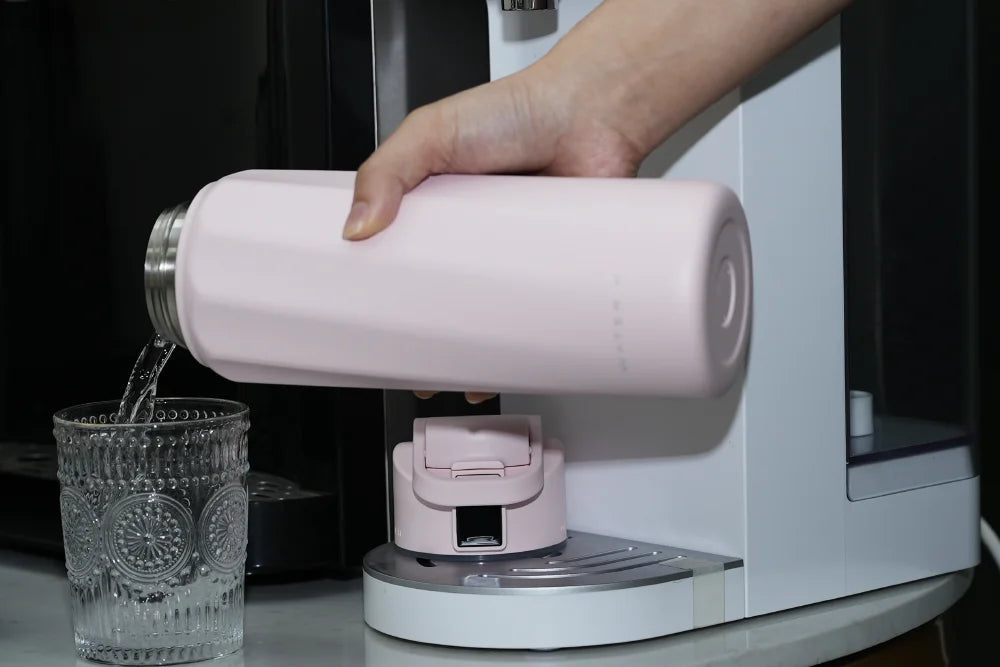
Hydrate Right, Day to Night: Avoid the Post-Work Water Rush
In the hustle and bustle of the modern workplace, staying hydrated often takes a back seat. Yet, proper hydration is essential for maintaining physical health and cognitive performance. This blog explores the importance of hydration for office workers, the challenges they face in maintaining adequate water intake, the dangers of dehydration and overhydration, and practical strategies for achieving balanced hydration throughout the day. We’ll also introduce the WaterH Smart Water Bottle, a technological solution designed to help you stay hydrated without the stress of constantly remembering to drink.
Why hydration is important for office workers?
For office workers, hydration is crucial in sustaining energy levels, focus, and overall well-being. Water is vital for numerous bodily functions, including regulating temperature, maintaining blood pressure, and aiding digestion. In a typical office environment, where stress and workload can be high, staying hydrated helps keep the mind sharp and the body energized.
Dehydration can reduce concentration, headaches, and fatigue, significantly impacting productivity and job performance. Conversely, adequate hydration keeps the mind clear, supports metabolism, and helps manage stress levels.
Common hydration challenges faced by office workers

Despite the well-known benefits of staying hydrated, many office workers need help to drink enough water during the workday. This issue often stems from a combination of factors, including:
- Busy schedules and distractions: With back-to-back meetings, tight deadlines, and a constant influx of emails, it's easy to forget to drink water. Many workers prioritize their tasks over hydration, leading to long periods without drinking.
- Limited access to water: While most offices provide water coolers or kitchen areas, the inconvenience of getting up frequently or long distances from workstations can deter regular water intake.
- Lack of habit: Some people do not have the habit of drinking water regularly. They may not feel thirsty or enjoy drinking water, leading them to neglect their hydration needs.
As a result, many workers find themselves drinking very little water throughout the day, only to realize their deficiency in the evening, leading to overcompensation.
The negative effects of dehydration and overhydration
Dehydration occurs when the body loses more water than it takes in. Even mild dehydration can cause headaches, dizziness, dry skin, and fatigue. It can also impair cognitive function, making concentrating or performing complex tasks difficult. Chronic dehydration can lead to more severe health issues, including kidney stones and urinary tract infections.
Overhydration, however, happens when too much water is consumed quickly. This can dilute the body's electrolytes, leading to a condition called hyponatremia, which can be dangerous and cause nausea, confusion, and even seizures. Drinking large amounts of water before bed can also disrupt sleep, causing frequent bathroom trips and poor sleep quality.
Both dehydration and overhydration can disrupt the body's balance and lead to various health problems, highlighting the importance of maintaining a balanced hydration routine.
Practical tips and strategies for maintaining a balanced hydration schedule

To avoid the pitfalls of dehydration and overhydration, it's important to develop a consistent and balanced hydration routine. Here are some practical tips:
- Set hydration goals: Determine the right amount of water for your body based on weight, activity level, and climate. A general guideline is to drink about 8 glasses (64 ounces) of water daily, but individual needs may vary.
- Spread water intake throughout the day: Instead of drinking large amounts at once, aim to sip water consistently throughout the day. This helps maintain hydration levels and prevents overloading the kidneys.
- Incorporate water breaks into your routine: Schedule regular water breaks, such as drinking water after every meeting or at the start of each hour. Pairing water intake with specific activities can help build a habit.
- Choose water-rich foods: Include fruits and vegetables with high water content, such as cucumbers, watermelon, and oranges. These not only contribute to hydration but also provide essential nutrients.
- Listen to your body: Pay attention to your thirst cues and drink water when thirsty. Thirst is a natural signal that your body needs more fluids.
Leveraging technology: WaterH Smart Water Bottle with timed reminders
In today’s digital age, technology can assist in maintaining healthy habits, including hydration. The WaterH Boost is an innovative solution designed to help you stay hydrated effortlessly. This smart bottle has features like timed reminders, hydration tracking, and notifications, ensuring you drink water consistently throughout the day.
Key features:
- Timed reminders: The WaterH smart water bottle can be set to remind you to drink water at regular intervals, helping you develop a consistent drinking habit.
- Hydration tracking: The bottle tracks your water intake and syncs with a mobile app, providing insights into your hydration patterns and helping you meet your daily goals.
- Customizable settings: Users can customize reminder intervals and daily goals based on their hydration needs.
This technology supports balanced hydration and integrates seamlessly into a busy lifestyle, making it easier to prioritize health without constant effort.
Conclusion
Staying hydrated is essential for overall health and productivity, especially for office workers who may easily neglect their water intake. By understanding the challenges and risks associated with improper hydration and implementing practical strategies, individuals can maintain a balanced hydration schedule. The WaterH Smart Water Bottle offers a convenient and effective solution for those looking to improve their hydration habits. Remember, the key to optimal hydration is consistency—hydrate right, day to night, and avoid the post-work water rush. Follow WaterH to find more tips for staying well-hydrated.
















